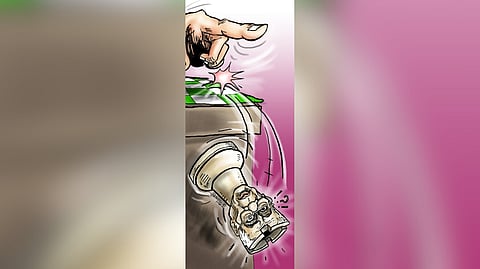
- NEWS
- the EDIT
- COMMENTARY
- BUSINESS
- LIFE
- SHOW
- ACTION
- GLOBAL GOALS
- SNAPS
- DYARYO TIRADA
- MORE

Sacked Philippine National Police (PNP) chief Nicolas Torre III forgot the rules (or did he even know them?) that in the corridors of power, loyalty is currency, ambition is poison and timing is everything.
Full of swagger as the man who arrested Apollo Quiboloy and former President Rodrigo Duterte, Torre thought himself indispensable. The jailor of gods and kings, he fancied himself above the rituals of Camp Crame and the delicate ballet of Malacañang politics.
Oh, was Torre so gravely mistaken? His first giant misstep was to exile Lt. Gen. Jose Melencio Nartatez to Mindanao, a bold move clearly intended to bury his number two in the boondocks.
Except Nartatez was no ordinary deputy. He was one of the three heirs by seniority to the top post after Rommel Marbil’s retirement, a PMA Class ’92 stalwart, and a man with ties that reached deep into both the Marcos and Duterte circles.
Nartatez was promptly appointed officer in charge of the PNP after Torre’s fall.
Torre demoting Nartatez was an insult carved in granite, not just for Nartatez but also for his perceived backer, Interior Secretary Jonvic Remulla, who chairs the National Police Commission (Napolcom).
Senators Ping Lacson and Bato dela Rosa — men who once sat on Torre’s throne — were blunt: no PNP chief could reshuffle his Command Group without clearance from the President or at least Napolcom. Torre thought himself above the tradition. He was not.
Napolcom even issued a memo telling him so. Torre’s response? To rub it in on the commission — and by extension Remulla — that they could shove their memo up their collective backsides. Then, in defiance, he kept Bernard Banac as his de facto deputy. Arrogance or ignorance? Both.
Torre’s second miscalculation was his reading of Ferdinand Marcos Jr.
He assumed that because he had been plucked from obscurity by Marcos as an outsider to the PMA mafia, he enjoyed the President’s full faith. But Marcos is nothing if not pragmatic.
He used Torre at a vulnerable moment, after his administration’s midterm debacle, when his popularity was bleeding out in surveys. Torre’s arrests gave him a fleeting glow of authority, a “toughie” shield to brandish against critics, including the Duterte clan mobilizing against him.
But Torre mistook being useful (Remulla called him an “attack dog”) for being indispensable. The thing about attack dogs is they may serve their master well — until they bite the wrong ankle, or start thinking they can roam the palace without a leash.
The third mistake? Delusions of grandeur. Torre wasn’t content being the President’s pit bull; he wanted to be a celebrity. That pathetic boxing stunt with Baste Duterte was less about sport than hubris — the general playing superstar in a political circus.
Worse, Torre was openly shoring up support for a 2028 senatorial run, fancying himself another Lacson or Bato. If there’s anything Malacañang abhors more than a hot air-balloon soldier, it’s a general who builds his own army. Attack dogs are meant to protect the house, not set up kennels of their own.
In truth, Torre misread his place on the Machiavellian chessboard. The President is the sun, and the generals are shadows — long or short depending on the hour. Torre thought he was the sun. The Palace reminded him he was merely the shadow.
The fall was swift. A letter from Executive Secretary Bersamin, “by order of the President,” sent Torre into oblivion. No farewell parade, no drawn-out curtain call — just a quick exile into the annals of footnotes.
Torre believed his proximity to power made him untouchable. In reality, he was a mere rook dressed up as a king. He forgot that when the daggers are unsheathed, there are no second rounds. Not even for a boxer-wannabe general. And so Torre exited without so much as a yelp, or did he?
We wait.
